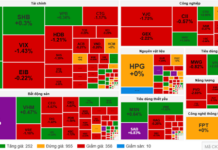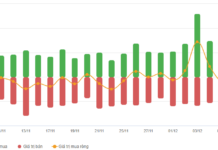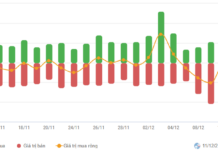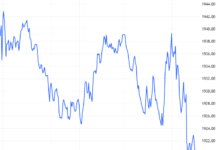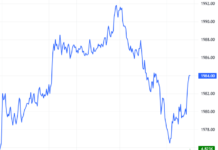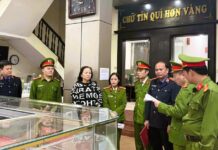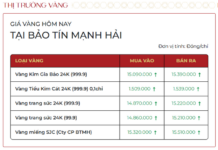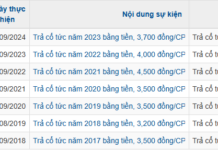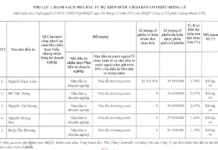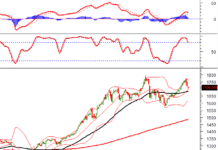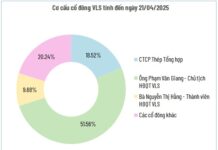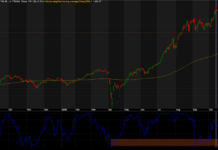On September 19, stock markets in Europe and Asia-Pacific, including Vietnam, witnessed positive growth following the US Federal Reserve’s decision to cut interest rates for the first time in four years, announced early that day.
Foreign investors halt net selling
US stock markets also surged on the night of September 18 and early morning of September 19 after the Fed announced a 0.5% interest rate cut, bringing the rate to around 4.75%-5%. However, concerns about a possible economic recession led to a slight dip by the end of the trading session. The US Dollar Index (DXY), measuring the greenback’s performance against six major currencies, fell to around 100.7 points following the Fed’s decision. Some analysts predict that the USD will continue to weaken next year as the Fed is expected to maintain its dovish stance.
Nguyen Duc Khang, Head of Analysis at Pinetree Securities, stated that the most positive impact of the Fed’s rate cut is the reduced pressure on the USD/VND exchange rate, allowing the State Bank of Vietnam (SBV) to maintain its loose monetary policy. In the past two months, the market has been anticipating this rate cut, as evident by the decline in the DXY and stabilization of domestic exchange rates after a prolonged period of highs.
“The Fed’s decision is positive, but investors should not expect a significant surge in the stock market as this move was already anticipated and priced in to some extent,” analyzed Mr. Khang.
The stock market still has positive factors ahead, as the Fed is expected to further lower interest rates, targeting a range of about 2.75%-3% by the end of 2026. If the Fed takes decisive action, it will be a very positive factor for the stock market.
“At this point, we expect foreign capital to halt its net selling cycle, which has persisted for nearly two years, and resume net buying. There are signs that foreign investors are returning to surrounding stock markets, such as Thailand and Indonesia,” commented Mr. Khang.
Foreign investors have also started net buying in Vietnam’s stock market for four consecutive sessions after a long period of net selling. On September 17, they net bought over VND 524 billion, and on September 19, they net bought more than VND 471 billion.
Le Tu Quoc Hung, Senior Head of Analysis at Dragon Capital Securities Company (VDSC), stated that as the Fed enters an interest rate cut cycle, the interest rate differential between currencies will start to narrow. The USD will relatively weaken compared to other currencies. In other words, the pressure on other currencies will ease, especially in developing economies like Vietnam, where foreign capital plays a significant role in investment and economic growth.
The cooling down of USD interest rates will create favorable conditions for the SBV to maintain its supportive policies with low-interest rates, aiming to sustain the economy’s potential growth rate at 6%-7% per year. Most sectors can also expect brighter business prospects with lower interest rates.

The stock market anticipates the Fed’s interest rate cuts and the roadmap for upgrading to attract foreign investors back to Vietnam. Photo: LAM GIANG
Paving a clearer path for market upgrade
Another very positive news for the stock market is the Ministry of Finance’s issuance of Circular No. 68/2024/TT-BTC, allowing foreign institutional investors to purchase stocks without 100% margin. Accordingly, foreign institutional investors can buy stocks on the same day (T+0) and make payments on the following days (T+1/T+2). This circular will take effect from the beginning of November 2024.
According to experts, Circular 68 is a crucial step for Vietnam’s stock market to be considered for an upgrade to emerging market status by FTSE Russell in 2025. Analysts from Mirae Asset Securities Company (MAS) stated that removing the funding constraint for foreign investors in stock trading would reduce financial costs and increase flexibility for investors.
Once upgraded, Vietnam’s stock market could attract funds from large investment funds such as the Vanguard FTSE Emerging Markets ETF. Mirae Asset experts estimate that attracting just about 0.6% of the large fund’s investment ratio could bring about $474 million to Vietnam. The inflow of foreign capital would not only come from funds using the FTSE Emerging Markets Index as a reference but also from other funds once the market is upgraded.
SSI Securities Corporation’s analysts shared that Circular 68 has amended four circulars related to foreign institutional investors’ ability to trade stocks without the requirement of pre-funding and the roadmap for English disclosure. This is a step closer to fulfilling the requirements for an upgrade to emerging market status by FTSE Russell.
“With the upgrade to emerging market status, the preliminary estimate of inflows from ETF funds alone could reach $1.7 billion, excluding active funds. FTSE Russell estimates that the total assets of active funds are five times that of ETF funds,” SSI experts stated.
According to Hoang Huy, a strategy analyst at Maybank Securities, it may take FTSE at least six months to evaluate the stability of the new mechanism and consult with their investors before upgrading Vietnam’s stock market in September 2025, or possibly earlier, in March 2025. Observing stock markets that have gone through similar upgrades, there is often a strong stock performance before and after the upgrade, and many expect the same to happen in Vietnam over the next 12 months.
“In fact, foreign capital has somewhat supported this outlook, with net selling value decreasing to $147 million in August 2024, a quarter of the levels in May or June 2024. The steady progress towards market upgrade is expected to gradually attract foreign investors back to the Vietnamese market, shifting to net buying in the coming months,” emphasized Mr. Huy.
Gold prices could reach $2,700 per ounce
Oil prices rose on September 19 following the Fed’s rate cut, with Brent crude trading around $74.47 per barrel and WTI crude increasing to approximately $70.98 per barrel.
The Fed’s rate cut typically stimulates economic activity and energy demand. However, some view it as a sign of a weakening US labor market, which could slow economic growth. The market is also monitoring tensions in the Middle East after a series of explosions targeted Hezbollah’s walkie-talkies and messaging devices, suspected to be the work of Israeli intelligence.
Gold prices also climbed to around $2,583 per ounce on September 19 after a slight dip. In the previous session, gold prices hit a record high of $2,599 per ounce. Kelvin Wong, a senior market analyst for Asia-Pacific at Oanda Forex Trading Company (US), predicted that gold prices could reach a new high of $2,640-$2,700 per ounce this year.
When Will the Vietnamese IB Market Bounce Back?
The Vietnamese IB market was once likened to a land of opportunity, but it has become stagnant in recent years due to various reasons. However, according to Mr. Nguyen Van Quang, Head of Investment Banking at NH Vietnam Securities Company (NHSV), it remains a market with strong long-term potential and could bounce back to life if Vietnam’s stock market is successfully upgraded.

